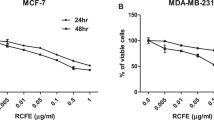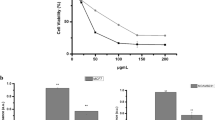Abstract
Plant polyphenols are nutraceutical components with relevant biological effects on human health. They act against development of several diseases including cancer. In this study, the methanolic extracts of four date palm Phoenix dactylifera leaves (Deglet Noor (DN), Barhee (B), Khalas (KS) and Khunezi (KZ)) collected from south Tunisia were preliminary analyzed for their effects against U87 (human glioblastoma) and MDA-MB-231 (human breast cancer) cell line development. Results showed that Barhee extract (30 μg/mL) was the most efficient to reduce the growth of both tumor cells to about 40% (p < 0.05) without inducing cytotoxicity. Significantly, KS, KZ, DN and B extracts (30 μg/mL) decreased MDA-MB-231 and U87 cell adhesion towards fibrinogen and fibronectin. Using integrin blocking antibodies, leaf extracts competitively decreased human glioblastoma cell attachment to immobilized antibodies by interfering to αvβ3 and α5β1 integrin receptors. At the same concentration, extracts decreased MDA-MB-23 and U87 cell migration performed with wound healing assay. Particularly, Barhee and Deglet Noor leaf extracts (30 μg/mL) significantly reduced U87 cell invasion by 52.92% (p < 0.01) and 74.56% (p < 0.01), respectively. Collegially, our findings revealed beneficial proprieties of four varieties of date palm leaf especially those displayed by DN and B extracts that may serve as active candidates against human glioblastoma and breast cancer progression.






Similar content being viewed by others
Data Availability
No datasets were generated or analysed during the current study.
Abbreviations
- HEPdL:
-
Phoenix dactylifera leaves
- DN:
-
Deglet Noor
- KS:
-
Khalas
- KZ:
-
Khunezi
- B:
-
Barhee
- MD-MB-321cells:
-
Human breast cancer cell line
- U87 cells:
-
Human glioblastoma cell line
References
Schafer EJ, Jemal A, Wiese D, Sung H, Kratzer TB, Islami F, Dahut WL, Knudsen KE (2023) Disparities and trends in genitourinary cancer incidence and mortality in the USA. Eur Urol 84:117–126. https://doi.org/10.1016/j.eururo.2022.11.023
Pacheco SO, Pacheco FJ, Zapata GM, Garcia JM, Previale CA, Cura HE, Craig WJ (2016) Food habits, lifestyle factors, and risk of prostate cancer in Central Argentina: a case control study involving self-motivated health behavior modifications after diagnosis. Nutrients 8:419. https://doi.org/10.3390/nu8070419
Pérez-Herrero E, Fernández-Medarde A (2015) Advanced targeted therapies in cancer: drug nanocarriers, the future of chemotherapy. Eur J Pharm Biopharm 93:52–79. https://doi.org/10.1016/j.ejpb.2015.03.018
Cragg GM, Pezzuto JM (2016) Natural products as a vital source for the discovery of cancer chemotherapeutic and chemopreventive agents. Med Princ Pract 25:41–59. https://doi.org/10.1159/000443404
Ghazzawy HS, Gouda MM, Awad NS, Al-Harbi NA, Alqahtani MM, Abdel-Salam MM, Abdein MA, Al-Sobeai SM, Hamad AA, Alsberi HM, Gabr GA, Hikal DM (2022) Potential bioactivity of Phoenix dactylifera fruits, leaves, and seeds against prostate and pancreatic cancer cells. Front Nutr 9:998929. https://doi.org/10.3389/fnut.2022.998929
Chakroun M, Khemakhem B, Mabrouk HB, El Abed H, Makni M, Bouaziz M, Drira N, Marrakchi N, Mejdoub H (2016) Evaluation of anti-diabetic and anti-tumoral activities of bioactive compounds from Phoenix dactylifera L's leaf: in vitro and in vivo approach. Biomed Pharmacother 84:415–422. https://doi.org/10.1016/j.biopha.2016.09.062
Dai J, Mumper RJ (2010) Plant phenolics: extraction, analysis and their antioxidant and anticancer properties. Molecules 15:7313–7352. https://doi.org/10.3390/molecules15107313
Dehelean CA, Marcovici I, Soica C, Mioc M, Coricovac D, Iurciuc S, Cretu OM, Pinzaru I (2021) Plant-derived anticancer compounds as new perspectives in drug discovery and alternative therapy. Molecules 26:1109. https://doi.org/10.3390/molecules26041109
Kriaa W, Fetoui H, Makni M, Zeghal N, Drira N (2012) Phenolic contents and antioxidant activities of date palm (Phoenix dactylifera L.) leaves. Int J Food Prop 15:1220–1232. https://doi.org/10.1080/10942912.2010.514673
Ziouti A, El Modafar C, Fleuriet A, EL Boustani S, Macheix JJ (1996) Phenolic compounds in date palm cultivars sensitive and resistant to Fusarium oxysporum. Biol Plant 38:451–457. https://doi.org/10.1007/BF02896679
John JA, Shahidi F (2019) Phenolic content, antioxidant and anti-inflammatory activities of seeds and leaves of date palm (Phoenix dactylifera L.). J Food Bioact 5:120–130. https://doi.org/10.31665/JFB.2019.5179
Srivastava S, Somasagara RR, Hegde M, Nishana M, Tadi SK, Srivastava M, Choudhary B, Raghavan SC (2016) Quercetin, a natural flavonoid interacts with DNA, arrests cell cycle and causes tumor regression by activating mitochondrial pathway of apoptosis. Sci Rep 6:24049. https://doi.org/10.1038/srep24049
Marvibaigi M, Amini N, Supriyanto E, Abdul Majid FA, Kumar Jaganathan S, Jamil S, Hamzehalipour Almaki J, Nasiri R (2016) Antioxidant activity and ROS-dependent apoptotic effect of Scurrula ferruginea (Jack) danser methanol extract in human breast cancer cell MDA-MB-231. PLoS One 11:e0158942. https://doi.org/10.1371/journal.pone.0158942
Touihri-Barakati I, Kallech-Ziri O, Morjen M, Marrakchi N, Luis J, Hosni K (2022) Inhibitory effect of phenolic extract from squirting cucumber (Ecballium elaterium (L.) A. Rich) seed oil on integrin-mediated cell adhesion, migration and angiogenesis. RSC Adv 12:31747–31756. https://doi.org/10.1039/d2ra02593k
Soung YH, Chung J (2011) Curcumin inhibition of the functional interaction between integrin α6β4 and the epidermal growth factor receptor. Mol Cancer Ther 10:883–891. https://doi.org/10.1158/1535-7163.MCT-10-1053
Shahbaz K, Asif JA, Liszen T, Nurul AA, Alam MK (2022) Cytotoxic and antioxidant effects of Phoenix dactylifera L. (Ajwa date extract) on oral squamous cell carcinoma cell line. Biomed Res Int 2022:5792830. https://doi.org/10.1155/2022/5792830
Khattak MNK, Shanableh A, Hussain MI, Khan AA, Abdulwahab M, Radeef W, Samreen MH (2020) Anticancer activities of selected Emirati date (Phoenix dactylifera L.) varieties pits in human triple negative breast cancer MDA-MB-231 cells. Saudi J Biol Sci 27:3390–3396. https://doi.org/10.1016/j.sjbs.2020.09.001
Santos BL, Oliveira MN, Coelho PL, Pitanga BP, da Silva AB, Adelita T, Silva VD, Costa Mde F, El-Bachá RS, Tardy M, Chneiweiss H, Junier MP, Moura-Neto V, Costa SL (2015) Flavonoids suppress human glioblastoma cell growth by inhibiting cell metabolism, migration, and by regulating extracellular matrix proteins and metalloproteinases expression. Chem Biol Interact 242:123–138. https://doi.org/10.1016/j.cbi.2015.07.014
Wang L, Ling Y, Chen Y, Li CL, Feng F, You QD, Lu N, Guo QL (2010) Flavonoid baicalein suppresses adhesion, migration and invasion of MDA-MB-231 human breast cancer cells. Cancer Lett 297:42–48. https://doi.org/10.1016/j.canlet.2010.04.022
Weng CJ, Yen GC (2012) Chemopreventive effects of dietary phytochemicals against cancer invasion and metastasis: phenolic acids, monophenol, polyphenol, and their derivatives. Cancer Treat Rev 38:76–87. https://doi.org/10.1016/j.ctrv.2011.03.001
Weng CJ, Yen GC (2012) Flavonoids, a ubiquitous dietary phenolic subclass, exert extensive in vitro anti-invasive and in vivo anti-metastatic activities. Cancer Metastasis Rev 31:323–351. https://doi.org/10.1007/s10555-012-9347-y
Funding
This work was supported by the Tunisian Ministry of Higher Education and Scientific Research (LR20IPT01).
Author information
Authors and Affiliations
Contributions
M.C. and M.M. wrote the main manuscript text and H.B.M prepared the Figs. 1, 2, 3, 4, 5 and 6. H.M., N.S.A., N.M., J.J., B.K., contributed to the study conception and design, writing - review & editing. All authors read and approved the final manuscript.
Corresponding author
Ethics declarations
Ethical Approval
Not applicable.
Informed Consent
Not applicable.
Conflict of Interest
All authors declare that they have no conflicts of interest.
Additional information
Publisher’s Note
Springer Nature remains neutral with regard to jurisdictional claims in published maps and institutional affiliations.
Supplementary Information
ESM 1
(DOCX 34 kb)
Rights and permissions
Springer Nature or its licensor (e.g. a society or other partner) holds exclusive rights to this article under a publishing agreement with the author(s) or other rightsholder(s); author self-archiving of the accepted manuscript version of this article is solely governed by the terms of such publishing agreement and applicable law.
About this article
Cite this article
Chakroun, M., Morjen, M., Mabrouk, H.b. et al. Anticancer Properties of Different Varieties of Date Palm (Phoenix dactylifera L.) Leaf Extracts in Human Tumor Cells: a Comparative Study. Plant Foods Hum Nutr 79, 518–525 (2024). https://doi.org/10.1007/s11130-024-01162-1
Accepted:
Published:
Issue Date:
DOI: https://doi.org/10.1007/s11130-024-01162-1




